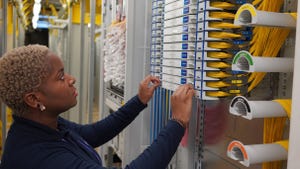Twitter's the Next Hypercloud Star (No Joke)
Like Amazon before it, Twitter's core strength might be its platform rather than the service it's best known for.

The cloud era launched when a company with a passionate following but marginal profitability got into a new line of business that at first seemed completely unrelated to its core competency. The move seemed downright ridiculous -- at first. But now that company dominates that new niche, with entrenched giants Microsoft, Google and IBM struggling to close the gap.
I'm referring of course to Amazon.com Inc. (Nasdaq: AMZN), which launched Amazon Web Services Inc. in 2006. Amazon was an online retailer, with a passionate loyal following but a history of profitability that's marginal at best. Amazon realized that it could leverage its expertise running a globe-spanning e-commerce site to provide IT infrastructure to developers and, later, enterprises. And so the hypercloud era was born.
Fast-forward to 2016 and we're looking at another company that's in a similar position to Amazon's ten years earlier. Twitter Inc. has a passionate global following and difficulty converting that following into profitability.
And, like Amazon in 2006, Twitter is sitting on a platform that can do a lot more than deliver on the company's legacy business. In Twitter's case, the legacy business is providing a messaging service and social network that delivers information in 140-character bursts.
The new direction: leveraging the Twitter platform to show users the real-time Internet -- sharing what's happening now, right this second, anywhere and everywhere in the world. Tweets of 140 characters are one way to deliver the real-time Internet -- but just one. You might say the Twitter service is just one application that can run on the Twitter platform.
Live streaming video is another such application, and Twitter has been delivering video of major sporting events, the Democratic and Republican national conventions, and Monday's Presidential debate. (See By the Numbers – Twitter Streams the NFL.)
But tweets and video are just the beginning. The Twitter platform can do a lot more, the same way that AWS is a lot more than a retail platform.
For example, a real-time Internet platform is necessary infrastructure for the Internet of Things (IoT); all those devices need to report back and communicate with each other immediately. Latency is fatal -- sometimes literally fatal, as in the case of self-driving cars, aerial drones, telesurgery and other real and projected uses for IoT.
Moreover, many smart cities and other IoT devices need to be able to send short bursts of information at low power -- something Twitter already excels at.
Want to know more about the cloud? Visit Light Reading Enterprise Cloud.
Viewing Twitter as a multipurpose platform -- rather than just a social network, video distributor or messaging service -- makes more sense of several suitors named recently as possibly buying the company. (See Twitter Soars on Takeover Rumors – Reports.)
For Microsoft Corp. (Nasdaq: MSFT) and Google (Nasdaq: GOOG), Twitter would add the real-time Internet to the arsenal of services they can offer to enterprises to win customers from Amazon. These platform-as-a-service vendors need a compelling capability to distinguish them from AWS, which is by far the market leader, and real-time Internet gives them that.
Also, for Google, Twitter would give the company a somewhat-successful social media platform -- a market Google has tried unsuccessfully to enter several times. Twitter would also beef up Google's video leadership, although as the owner of YouTube, Google hardly needs help in that area.
Next page: Ditch Dorsey
Ditch Dorsey
Indeed, if a competitor wanted to stop Google from acquiring Twitter, appealing to regulators on anti-competitive grounds might not be a bad way to go.
Microsoft gets all those things and another social media platform to add to its collection, following the LinkedIn acquisition. Indeed, that's a reason Microsoft might pass on Twitter; the folks in Redmond might say no thanks, they just ate. (See Under Microsoft, LinkedIn's Big Cloud Plans Face Uncertain Future.)
The real-time Internet platform makes sense of Salesforce as a possible suitor. Salesforce acquired the Demandware e-commerce cloud service in June and relaunched it this week as Commerce Cloud. Commerce Cloud integrates online, mobile, and retail sales -- three areas that need real-time responsiveness. A customer made to wait is a customer lost. (See Salesforce Adds Einstein AI to Commerce Cloud and Salesforce Scoops Up Demandware for $2.8B.)
Also, Twitter's first business use was for customer service, which of course complements Salesforce's CRM mainstay.
Still, a Salesforce acquisition of Twitter would be tough. Twitter's market cap is $20.38 billion, compared with $45.28 billion for Salesforce. That might be more of a merger than an acquisition, and two so very different companies seem like unlikely marriage partners.
Speaking of Verizon: It's another rumored suitor, with the same benefits from Twitter that Microsoft and Google would get. Verizon has its own cloud platform, as well as a strategic direction to deliver enterprise cloud connectivity; Twitter could propel Verizon a lot closer to the ranks of top cloud providers. (See In the Cloud Era, It’s About Connectivity.)
Moreover, Twitter could help Verizon's ambitions of building a media empire that could challenge Google and Facebook for ads, following the acquisition of Yahoo and AOL. (See Verizon Sports Big Plans for Yahoo.)
And all these guys -- Google, Microsoft, Verizon and Salesforce -- would also enjoy the massive amounts of juicy, delicious data that Twitter generates, to beef up those companies' big data and AI offerings.
The odd man out in the acquisition speculation is Disney. For Disney, buying Twitter would likely be a straight media play, expanding its video empire to a new platform. And that's if it is serious about acquiring Twitter, about which I'm highly skeptical.
Of course, Twitter might still decide to remain independent and build that real-time Internet cloud platform on its own. To do that, it would have to go private, and jettison CEO Jack Dorsey, who's fixated on Twitter's social media and news capabilities. Then again, it's past time Twitter ditched Dorsey anyway: Unlike Dorsey's idol Steve Jobs, who also founded a company, was driven out, and returned, Dorsey has been unable to turn his corporate progeny around after a year back in charge.
— Mitch Wagner, 
 , Editor, Light Reading Enterprise Cloud
, Editor, Light Reading Enterprise Cloud
About the Author(s)
You May Also Like





.jpg?width=300&auto=webp&quality=80&disable=upscale)






